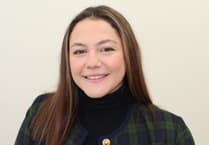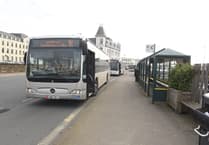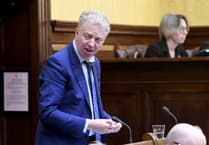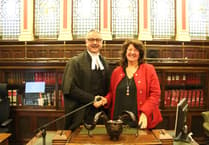Bishop Peter Eagles called three witnesses to give evidence and opinion at the bar of the Legislative Council.
News of the witnesses called by the Bishop was only confirmed on the morning of the sitting.
It certainly seemed to catch off guard some MLCs, who had previously been confident they would be able to deal with both the second reading and the clauses stage on the same day.
The first to give evidence was Professor John Wyatt, a professor of ethics and perinatology at University College, London.
He said he was a specialist in the care of new-born and premature babies. He also said he was a member of the ethics council of the Royal College of Paediatrics and Child Health.
Professor Wyatt has written numerous articles for the Christian Medical Fellowship website, but did not mention his involvement with that group when outlining his background. However, he confirmed his Christian beliefs after Tanya August-Hanson asked him what his personal views were.
In response to a question from Bill Henderson, he also confirmed he was not speaking on behalf of any of the organisations he had referred to when giving his background.
He aired his concerns at the provision in the bill for abortion on request up to 14 weeks. He argued 12 weeks - as adopted by many European countries - was a preferable limit.
When questioned about the provision for abortion in specified circumstances in the 15- to 23-week period and in very serious circumstances after 24 weeks, he said that at the UK’s leading, well-equipped university hospitals, up to 50% of babies born at 23 weeks could survive, although he admitted the national average in the UK was dramatically lower, at 10%-20%.
The next witness called by the Bishop was Dr Mary Neal, a senior law lecturer at the University of Strathclyde.
She expressed concern that the provisions for conscientious objection had greater protection for those already in employment that those applying for a job. She even read out a suggested amendment that she had drafted.
Once again, she confirmed that her evidence was her own, rather than on behalf of any of the organisations with that she was involved with.
When asked what her position was on abortion, she said it was ’nuanced’ and there were instances where she felt it was ’morally permissible’ but there were other times when she would have ’reservations’.
Dr Alex Allinson (Ramsey), the prime mover behind the Abortion Reform Bill, was also called on to answer questions from MLCs - something that had been signalled at an earlier stage.
He rejected any suggestion the Bill would end up putting greater pressure on women to have an abortion and he said by allowing more time and choice, the aim was to actually reduce the number of abortions.
The 14-week limit and 15- to 23-week limits meant women were less likely to be forced into a rushed decision.
He said that society needed to address the issues of shame felt by women in a difficult situation.
’We need to address that thought decent training and decent counselling of women in those circumstances, but not by making access harder and driving this underground.’
It was important to end the situation where women put themselves at risk by seeking illegal abortions.
He pointed out the BMA ethics committee and many medical organisations were consulted during the drafting of the legislation.
The Bill, he said, was about improving access to abortion services that already existed but most women were excluded from by the current restrictive regime.
Currently, he said, women were ’being exiled to the UK to pay for private treatment’.
Other witnesses to give evidence included pharmacist Maire Stapleton, also called by the Bishop, and counsellor Debbie Morrisey, called by Ms August-Hanson.




